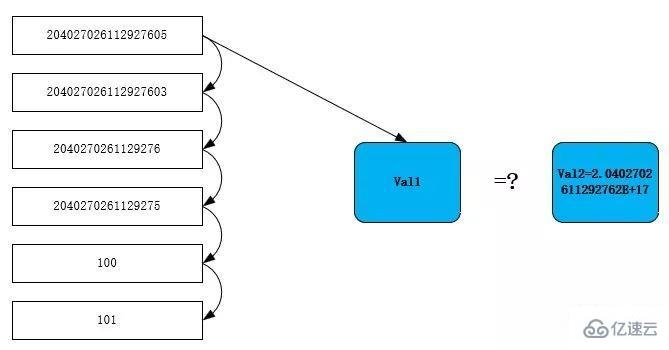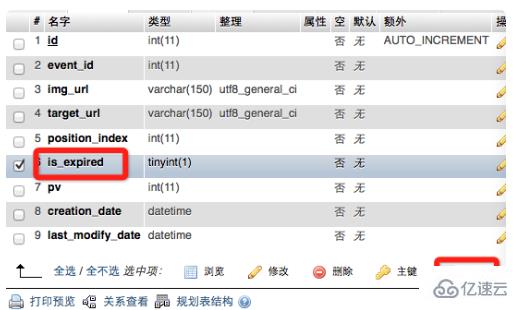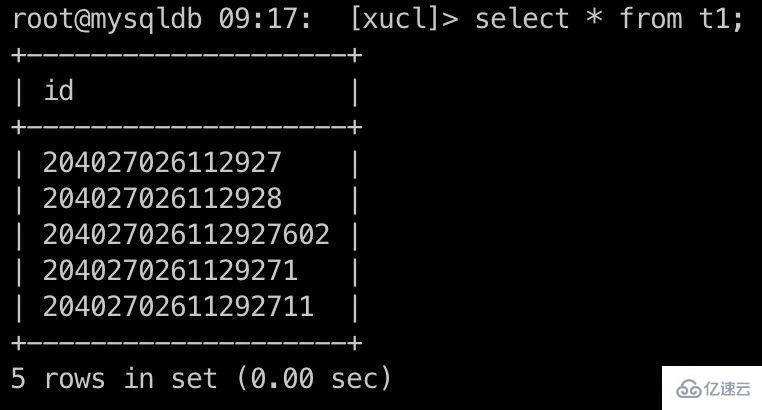共計(jì) 5514 個(gè)字符,預(yù)計(jì)需要花費(fèi) 14 分鐘才能閱讀完成。
自動(dòng)寫代碼機(jī)器人,免費(fèi)開通
這篇文章主要介紹 MySQL 中隱式轉(zhuǎn)換的示例分析,文中介紹的非常詳細(xì),具有一定的參考價(jià)值,感興趣的小伙伴們一定要看完!
一、問(wèn)題描述
root@mysqldb 22:12: [xucl] show create table t1\G
*************************** 1. row ***************************
Table: t1
Create Table: CREATE TABLE `t1` ( `id` varchar(255) DEFAULT NULL
) ENGINE=InnoDB DEFAULT CHARSET=utf8
1 row in set (0.00 sec)
root@mysqldb 22:19: [xucl] select * from t1;
+--------------------+
| id |
+--------------------+
| 204027026112927605 |
| 204027026112927603 |
| 2040270261129276 |
| 2040270261129275 |
| 100 |
| 101 |
+--------------------+
6 rows in set (0.00 sec)奇怪的現(xiàn)象:
root@mysqldb 22:19: [xucl] select * from t1 where id=204027026112927603;
+--------------------+
| id |
+--------------------+
| 204027026112927605 |
| 204027026112927603 |
+--------------------+
2 rows in set (0.00 sec)
什么鬼,明明查的是 204027026112927603,為什么 204027026112927605 也出來(lái)了
二、源碼解釋
堆棧調(diào)用關(guān)系如下所示:

其中 JOIN::exec() 是執(zhí)行的入口,Arg_comparator::compare_real() 是進(jìn)行等值判斷的函數(shù),其定義如下
int Arg_comparator::compare_real()
/*
Fix yet another manifestation of Bug#2338. Volatile will instruct
gcc to flush double values out of 80-bit Intel FPU registers before
performing the comparison.
*/
volatile double val1, val2;
val1= (*a)- val_real();
if (!(*a)- null_value)
{ val2= (*b)- val_real();
if (!(*b)- null_value)
{ if (set_null)
owner- null_value= 0;
if (val1 val2) return -1;
if (val1 == val2) return 0;
return 1;
}
}
if (set_null)
owner- null_value= 1;
return -1;
}
比較步驟如下圖所示,逐行讀取 t1 表的 id 列放入 val1,而常量 204027026112927603 存在于 cache 中,類型為 double 類型(2.0402702611292762E+17),所以到這里傳值給 val2 后 val2=2.0402702611292762E+17。

當(dāng)掃描到第一行時(shí),204027026112927605 轉(zhuǎn)成 doule 的值為 2.0402702611292762e17,等式成立,判定為符合條件的行,繼續(xù)往下掃描,同理 204027026112927603 也同樣符合

如何檢測(cè) string 類型的數(shù)字轉(zhuǎn)成 doule 類型是否溢出呢? 這里經(jīng)過(guò)測(cè)試,當(dāng)數(shù)字超過(guò) 16 位以后,轉(zhuǎn)成 double 類型就已經(jīng)不準(zhǔn)確了,例如 20402702611292711 會(huì)表示成 20402702611292712(如圖中 val1)


MySQL string 轉(zhuǎn)成 double 的定義函數(shù)如下:
{ char buf[DTOA_BUFF_SIZE];
double res;
DBUG_ASSERT(end != NULL ((str != NULL *end != NULL) ||
(str == NULL *end == NULL))
error != NULL);
res= my_strtod_int(str, end, error, buf, sizeof(buf));
return (*error == 0) ? res : (res 0 ? -DBL_MAX : DBL_MAX);
}
真正轉(zhuǎn)換函數(shù) my_strtod_int 位置在 dtoa.c(太復(fù)雜了,簡(jiǎn)單貼個(gè)注釋吧)
/*
strtod for IEEE--arithmetic machines.
This strtod returns a nearest machine number to the input decimal
string (or sets errno to EOVERFLOW). Ties are broken by the IEEE round-even
rule.
Inspired loosely by William D. Clinger s paper How to Read Floating
Point Numbers Accurately [Proc. ACM SIGPLAN 90, pp. 92-101].
Modifications:
1. We only require IEEE (not IEEE double-extended).
2. We get by with floating-point arithmetic in a case that
Clinger missed -- when we re computing d * 10^n
for a small integer d and the integer n is not too
much larger than 22 (the maximum integer k for which
we can represent 10^k exactly), we may be able to
compute (d*10^k) * 10^(e-k) with just one roundoff.
3. Rather than a bit-at-a-time adjustment of the binary
result in the hard case, we use floating-point
arithmetic to determine the adjustment to within
one bit; only in really hard cases do we need to
compute a second residual.
4. Because of 3., we don t need a large table of powers of 10
for ten-to-e (just some small tables, e.g. of 10^k
for 0 = k = 22).
*/既然是這樣,我們測(cè)試下沒有溢出的案例
root@mysqldb 23:30: [xucl] select * from t1 where id=2040270261129276;
+------------------+
| id |
+------------------+
| 2040270261129276 |
+------------------+
1 row in set (0.00 sec)
root@mysqldb 23:30: [xucl] select * from t1 where id=101;
+------+
| id |
+------+
| 101 |
+------+
1 row in set (0.00 sec)結(jié)果符合預(yù)期,而在本例中,正確的寫法應(yīng)當(dāng)是
root@mysqldb 22:19: [xucl] select * from t1 where id= 204027026112927603
+--------------------+
| id |
+--------------------+
| 204027026112927603 |
+--------------------+
1 row in set (0.01 sec)三、結(jié)論
避免發(fā)生隱式類型轉(zhuǎn)換,隱式轉(zhuǎn)換的類型主要有字段類型不一致、in 參數(shù)包含多個(gè)類型、字符集類型或校對(duì)規(guī)則不一致等
隱式類型轉(zhuǎn)換可能導(dǎo)致無(wú)法使用索引、查詢結(jié)果不準(zhǔn)確等,因此在使用時(shí)必須仔細(xì)甄別
數(shù)字類型的建議在字段定義時(shí)就定義為 int 或者 bigint,表關(guān)聯(lián)時(shí)關(guān)聯(lián)字段必須保持類型、字符集、校對(duì)規(guī)則都一致
最后貼一下官網(wǎng)對(duì)于隱式類型轉(zhuǎn)換的說(shuō)明吧
1、If one or both arguments are NULL, the result of the comparison is NULL, except for the NULL-safe
= equality comparison operator. For NULL = NULL, the result is true. No conversion is needed.
2、If both arguments in a comparison operation are strings, they are compared as strings.
3、If both arguments are integers, they are compared as integers.
4、Hexadecimal values are treated as binary strings if not compared to a number.
5、If one of the arguments is a TIMESTAMP or DATETIME column and the other argument is a
constant, the constant is converted to a timestamp before the comparison is performed. This is
done to be more ODBC-friendly. This is not done for the arguments to IN(). To be safe, always
use complete datetime, date, or time strings when doing comparisons. For example, to achieve best
results when using BETWEEN with date or time values, use CAST() to explicitly convert the values to
the desired data type.
A single-row subquery from a table or tables is not considered a constant. For example, if a subquery
returns an integer to be compared to a DATETIME value, the comparison is done as two integers.
The integer is not converted to a temporal value. To compare the operands as DATETIME values,
use CAST() to explicitly convert the subquery value to DATETIME.
6、If one of the arguments is a decimal value, comparison depends on the other argument. The
arguments are compared as decimal values if the other argument is a decimal or integer value, or as
floating-point values if the other argument is a floating-point value.
7、In all other cases, the arguments are compared as floating-point (real) numbers.以上是“MySQL 中隱式轉(zhuǎn)換的示例分析”這篇文章的所有內(nèi)容,感謝各位的閱讀!希望分享的內(nèi)容對(duì)大家有幫助,更多相關(guān)知識(shí),歡迎關(guān)注丸趣 TV 行業(yè)資訊頻道!
向 AI 問(wèn)一下細(xì)節(jié)

